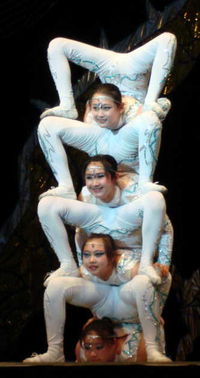For the last session of Agile Open Northwest, Chris pulled out a Greatest Hit, his Group Wisdom Without Groupthink workshop on the topic, "What Makes Agile Projects Succeed?" This workshop teaches a structured brainstorming technique while exploring the topic–a two fer one proposition. First, participants brainstorm silently on the topic, then there are several rounds in which people list their ideas while a scribe posts them on the wall. We had around thirty ideas from this group of around fifteen people. Next, everyone got eight stickers and voted for their top choices. At the end, we rearranged the items according to their popularity and discussed the results.
The winning notiions, as someone pointed out, emphasized teamwork over the technical aspects of agile. "How can Continuous Integration rank so low!?!?" one developer cried. Well, it's possible that in a room full of technical experts, these things are taken for granted and thus don't rank as "important" even though they are essential! Every group we lead through this exercise has a different outcome, as you can see here and here.
Below are the rankings for this group:

 There was a moment, sitting in a session billed as "An Oral History of Agile," when
There was a moment, sitting in a session billed as "An Oral History of Agile," when  Chris just published an article on InfoQ called
Chris just published an article on InfoQ called  Is Agile a culture or a process?
Is Agile a culture or a process? Chris and I have spent a fair portion of the past week preparing session proposals for the Agile 2009 conference in Chicago. So far we're submitted five, and have several more in the pipeline, so I've gotten to know my way aorund the submission process…
Chris and I have spent a fair portion of the past week preparing session proposals for the Agile 2009 conference in Chicago. So far we're submitted five, and have several more in the pipeline, so I've gotten to know my way aorund the submission process… We've heard plenty of anecdotal evidence suggesting that tech companies are limiting travel to conferences as part of their cost-cutting measures, and as a result, conference registrations appear to be down. It seems to me that this is a false economy; training your people to be better at their jobs is probably the best approach to increasing productivity per capita in lean times, and the networking that takes place benefits everyone and puts your company in the marketplace of ideas. I say, you're either in or out of the boat, and if you're in, there's no point to having just one oar in the water, because that will make you spin in circles the harder you paddle. I used to teach sailing, so I am in fact an authority on these matters.
We've heard plenty of anecdotal evidence suggesting that tech companies are limiting travel to conferences as part of their cost-cutting measures, and as a result, conference registrations appear to be down. It seems to me that this is a false economy; training your people to be better at their jobs is probably the best approach to increasing productivity per capita in lean times, and the networking that takes place benefits everyone and puts your company in the marketplace of ideas. I say, you're either in or out of the boat, and if you're in, there's no point to having just one oar in the water, because that will make you spin in circles the harder you paddle. I used to teach sailing, so I am in fact an authority on these matters.